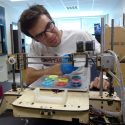Location technology homes in on where stuff, people are
If you commute by mass transit in Madison or Chicago, Jignesh Patel can tell you, to the minute, when your bus will pull up to your stop. He can do this no matter the weather or traffic conditions.
![[photo] Jignesh.](http://www.news.wisc.edu/story_images/1799/original/Patel_Jignesh_phone09_3917.jpg)
Jignesh Patel, a professor of computer sciences, uses his smart phone to check the real-time location of a Madison Metro bus as he waits at a city bus stop on State Street. Patel and another alumnus, Karthikeyan Ramasamy, are co-founders of Locomatix, a technology company that is developing location-aware services using a combination of smart-phone applications and publicly available information such as streams of GPS data.
Photo: Jeff Miller
Strolling through an airport, Patel, a professor of computer sciences at the University of Wisconsin–Madison, can tell without looking if friends or colleagues are nearby.
If you own a coffee shop, Patel can equip you to send out electronic coupons, good for just the next 30 minutes, to customers who happen to be within a five-block radius of your shop the second you hit the send key. If you are a physician in a hospital waiting for a critical piece of equipment or blood plasma, Patel can tell you exactly where those vital supplies are and how long they will take to be delivered.
Welcome to the world of “location aware services,” a technology that equips smart phones and other devices such as GPS receivers to not only tell you where you are, but where the things or people you want to hook up with are located — in real time. The advent of technologies that can sense place and continuously stream that information, explains Patel, is expected to underpin an emerging phenomenon known as “mobile commerce,” which is expected to grow to a multibillion-dollar market within the next two years.
“Location is now becoming an integral part of information,” explains Patel, noting that more and more electronic devices are coming equipped with technologies that can tell users exactly where they are on the planet. Combined with new, high-performance database management systems and software applications that automatically and continuously fetch information of interest, it will soon be possible to track just about anything — or anyone — who’s plugged into the system.
As Patel describes it, the idea of location-aware services is to take advantage of “the cloud of information” transmitted through the ether by computers, GPS devices, smart phones and RFID chips by equipping devices such as smart phones to sense and grab information of interest to the user. “Information technology in this dynamic space is missing this location angle,” he says.
For example, Patel, who developed database technologies to streamline access and sort through the enormous mass of free-flowing information in the ether while he was on the faculty at the University of Michigan, uses the technology to find people in his social network who might be transiting the same airport. “You may want to know if a friend is nearby,” he explains.
Much of the information that gives location aware technology its utility, he notes, is available on the Web, but users must actively seek it. The technology developed by Patel and his colleagues enables mobile devices to be proactive in their quest for information.
The system “constantly takes in data, blends it, and mixes and matches to figure out who needs what information when and delivers it,” he says. “The system is constantly working for you. You’ve told it the information you need, and now it continuously works for you looking for things that match your needs”
Traditional technology, he argues, doesn’t do that.
“A traditional Web search for a restaurant doesn’t know where I am,” he notes. “It simply serves the information that is available on the Web without deeply factoring my location and other preferences. It also doesn’t have an alert feature based on my current location, and it doesn’t present the information in an easy-to-use way.”
To capitalize on the emerging technologies that underpin location aware services, Patel, a UW alumnus, teamed up with Karthik Ramasamy, another UW–Madison alumnus, in 2007 to form a company known as Locomatix. Using customized smart phone apps and the database tools that they developed for combing streaming information, Locomatix provides location aware services using publicly available data such as the stream of GPS data from the Chicago Transit Authority and Madison buses, transit systems used as test beds for the new technology.
The company’s engineering team is largely based in Madison, while its business office resides in California’s Silicon Valley.
The market for the company’s product, he says, will only grow as GPS and other location providing technology becomes ubiquitous. The Locomatix system, he says, can be adapted to help keep track of just about anything in real time.
Keeping track of people, the Wisconsin computer scientist acknowledges, is rife with privacy issues, but people plugged into the system can, with the push of a button or predetermined scheduling, go into privacy mode and fall off the radar. In addition, the data that streams through the company’s servers is scrambled and not archived to help ensure privacy. “Privacy is a really, really crucial issue for us,” he says. “It’s a major concern, but built-in privacy options are part of the DNA of the system’s architecture.”
Patel envisions a future where location aware technology is the norm: “All of this is based on a solid platform and information is delivered in different ways, for example to a GPS system in a car or a smart phone,” he says. “But the application base is much broader than smart phones. Soon, laptop computers will be location aware.”
The sky — and its invisible cloud of information — is the limit.

